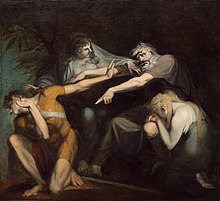
Back Θηβαΐς (Στατίου) Greek Tebaida Spanish Thébaïde (Stace) French Tebaide (Stazio) Italian テーバイド Japanese Tebaida LFN Thebaiden (Statius) NB Tebaida (epos) Polish Tebaida (Estácio) Portuguese Фиваида (Стаций) Russian
| Thebaid | |
|---|---|
| by Statius | |
 1786 oil painting by Henry Fuseli depicting the curse of Oedipus | |
| Written | 80–90 AD |
| Language | Latin |
| Genre(s) | Epic poetry |
| Meter | Dactylic hexameter |
| Lines | 9748 |
The Thebaid (/ˈθiːbeɪ.ɪd/; Latin: Thēbaïs, lit. 'Song of Thebes') is a Latin epic poem written by the Roman poet Statius. Published in the early 90s AD, it contains 9748 lines arranged in 12 books, and recounts the clash of two brothers, Eteocles and Polynices, over the throne of the Greek city of Thebes. After Polynices is sent into exile, he forges an alliance of seven Greek princes and embarks on a military campaign against his brother.
Although its source material derives predominantly from the Greek literary tradition, the Thebaid has close ties with other Latin texts such as Vergil's Aeneid and the tragedies of Seneca the Younger. The poem's central themes include the relationship between politics and the family, civil war, and the amoral acts to which it gives rise. Critics have also noted the poem's innovative depiction of Roman mythology. Following in the footsteps of Ovid's Metamorphoses, Statius used an episodic structure which is held together by subtle links between individual episodes.
The Thebaid was not widely read in antiquity, but was held in high esteem throughout the Middle Ages, when multiple adaptions of the poem were composed in vernacular languages. Preserved through the Carolingian Renaissance, the text of the Thebaid reached modernity without the recognition it once held. While classical scholars of the 19th and early 20th century criticised the poem for a perceived lack of originality and taste, a resurgence of critical interest has since brought it closer to the centre of the literary canon.
© MMXXIII Rich X Search. We shall prevail. All rights reserved. Rich X Search